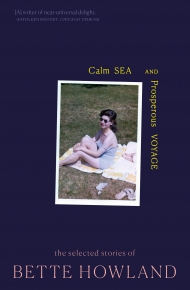On Colin Barrett’s “Stand Your Skin”
• Belinda McKeon • March 31, 2015
Let’s start the morning and kill the day, says one of the teenage characters in Colin Barrett’s “Stand Your Skin.” The drink doesn’t help, thinks his central character, an anxious, life-ravaged young man nicknamed Bat, but it does help.
I wish it were otherwise, but if there are two lines that get more precisely at the grim reality of what life is like for large swathes of young people in present-day, recession-pulverized small-town Ireland, I’ve yet to read them. Bat spends his days working in a service station on the outskirts of Glanbeigh, the fictional town in which all of Barrett’s stories are set (his debut collection, Young Skins, has just been published), and the bearable minutes of those days are spent on break in the station’s rest area, a concrete enclosure “done up to suggest a picnic area” in which all possibility of the pastoral has been soundly stamped to gray; the playground is an “aluminum wreck,” obscenities are carved into every surface, and weeds “have grown up and died in the fistulas along the crumbling perimeter.”
Look at that word. Fistulas. I had to Google it, and then I image-searched it, and then I closed the window and tried to forget the things I’d seen. Take it from me: it’s an abnormal connection that grows between parts of the body between which there should be no connection, and it takes hold, and it makes sure that nothing can be the same way again.
Bat, who earned his moniker partly because of the extreme myopia that went undiagnosed all through his schooling, knows only too well how fistulas physical and psychological can force themselves onto the parts of a life. Disfigured and traumatized by a long-ago act of violence as terrible in its randomness as in its savagery, he is a damaged boy, his face put back together messily, his head pounding always, and tinnitus droning like constant fluid in his ears.
Years later, he is still nervous around people; touch his shoulder in a bar and his hand will close around a phantom pint, needing the reassurance of it, needing to be weighted. He is not violent, but something that is worse, maybe, in a certain small-town setup: he is sensitive, and determined to practice a kind of mindfulness, and determined to try and keep himself clear of the trouble that is always festering between his townspeople, always looking for its way to snake out of suggestion and into something visceral and real. At the service station, Bat works with two others: Heg, who is eighteen and soon to go back to college now that the summer is ending—"The brain boxes are off to brain box land,” mutters another local lad at Heg’s leaving party—and Tain, whose name seems a nod towards the ancient Irish epic in which a woman wages war on a province of men. Barrett’s Tain, fifteen and fragile with borrowed bravado, has no such option, and Bat worries for her, but as Bat well knows by now, worry makes nothing happen. In a town in which youth seems valuable only for the energy with which it allows people to destroy themselves, in which beauty is a thing either to be feared or to be badly fucked—and afterwards deeply resented in either case—in a town like this, Bat would do well to keep his thoughts on the lives of others to himself.
But Barrett’s writing makes the bleakness of all of this somehow beautiful. He evokes Bat, the physical state of him, with the care of an art historian poring over a Pre-Raphaelite form; the “scuzzy cascade” of hair, its “nest of flubs, snarls and knots”, the kraken tattoo on his forearm, the “balky hydraulics” of his permanently wrecked jaw. The details of Bat’s nervy solicitude are marvelous; his guilty use of Tain’s underarm deodorant in the service station restroom, his earnest library Internet research into just how wrong the wrongness between Heg and Tain may be, the joy of his nighttime motorbike rides “deep into the countryside’s emptinesses,” deep into his own desire to come roaring out of his own ravaged hide. In his dreams, he cries, and his mother asks him about his medication, perhaps because those are things which the caution and pretending of the daytime will not allow; at night he goes to his mother’s roof to drink a six-pack of beer which will slice agony into his eye sockets come the morning. Bat doesn’t want to kill the days, not the way Heg does. But around here, the days get on with a killing all their own.
Read "Stand Your Skin" by Colin Barrett in APS 20.
Back to Top
Author
Belinda McKeon’s second novel, Tender, will be published in June by Picador (UK) and in the US by Lee Boudreaux Books in 2016. Originally from Ireland, she lives in New York. Her website is www.belindamckeon.com.
Categories
Archive
About
A Public Space is an independent, non-profit publisher of the award-winning literary and arts magazine; and A Public Space Books. Since 2006, under the direction of founding editor Brigid Hughes the mission of A Public Space has been to seek out and support overlooked and unclassifiable work.
Featured Title

"A ferocious sense of engagement... and a glowing heart." —Wall Street Journal
Current Issue

Subscribe
A one-year subscription to the magazine includes three print issues of the magazine; access to digital editions and the online archive; and membership in a vibrant community of readers and writers.
Newsletter
Get the latest updates from A Public Space.
